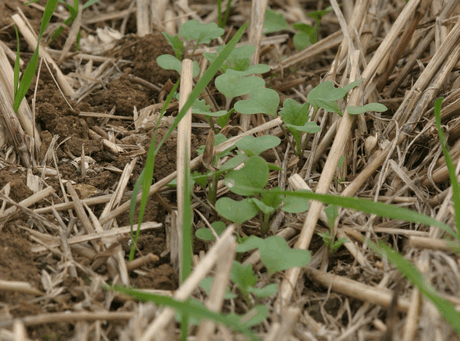Slug battle continues for late-emerging oilseed rape crops

Slug control and early nitrogen to help promote rapid establishment are the priorities for emerging oilseed rape crops as the drilling window closes in most parts of the country.
In regions where harvest was severely delayed, oilseed rape plantings have been affected. Strutt & Parker‘s Robert Sullivan said only 15-20% of the expected area in Northumberland had been planted by Monday [22 September]. “It is now or never this week and a lot have already closed the door.”
Late planting was not without risks too, he said. “There have been a lot of failures already. Land has slumped badly and crops have drowned.”
In Yorkshire the picture was better, but not much, said independent agronomist Patrick Stephenson.
Growers had abandoned plans to use min-till kit to get a seed-bed in many cases. “They have been resurrecting any power-harrow combination they can find, using various degrees of flat-lift sub-soiling and then scratch drilling on top,” he said.

Oilseed rape is emerging quickly in warm soils, but moist trash is creating perfect conditions for slugs
What rape had been drilled, broadcast or mauled was fighting a battle against slugs and flea beetle, he added. “Flea beetle is rampant, and inexpensive pyrethroids appear not to be defeating the pest.”
Flea beetle was also a problem in Lincolnshire, where most crops had now been drilled, said agronomist Sean Sparling. Even on crops given a flea beetle-active seed treatment, feeding damage was a problem.
But slugs were a greater menace. “Over the past three or four days they have been set off again,” said Mr Sparling.
An early nitrogen application was important to help promote bacteria that broke down trash, which was providing the perfect environment for slugs, he advised. On emerged crops, growers should use a granular or prill fertiliser rather than liquid, to avoid crop damage.
Early N would also help establish crops more quickly, said Mr Stephenson. “You want to get to four to six true leaves before the first frosts hit.”
In the south, many crops were drilled during the last week, said Steve Cook of Hampshire Arable Systems. “The area is down, maybe by 10%. Land just wasn’t workable on some farms.”
About 10% had been, or would need, re-drilling, mostly because of slugs, he said. “It is particularly bad where ground was worked wet in August, and conditions then got even worse.”
Growers in the far south-west, where oilseed rape area might be one-third down, were also struggling with slugs, said Neil Potts of Matford Arable. “Some growers are saying they have put slug pellets on and within 48 hours they have all gone.” He advised treating prophylactically at drilling and then monitoring for further activity with baits.
One-quarter of Bedfordia Farm‘s 600ha of oilseed rape remained to be drilled at the beginning of the week. The farm had had to resort to ploughing everything, said managing director Ian Smith. “It’s been so wet, no tined instrument will move through our heavy soils.”
A plan to establish the crop with a new sub-soiler has also been scuppered by the wet. “We’ve had to go back to our old 6m sub-soiler,” he added. “But even then about 150ha has just been put on the soil, rather than drilled.”
The other major concern was slugs. he said. “We are monitoring constantly and pelleting every five to seven days.”
Oilseed rape progress
- Drilling complete in east and south
- Northern England and south-west areas down
- Slugs major threat
- Some re-drilling necessary
- Early N advised
Go to our forum: Autumn sowings and more

